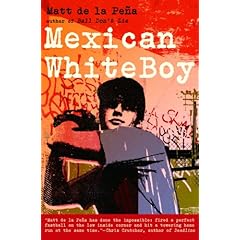 Danny is a quiet boy (as in almost mute) not because he can’t talk, but because he doesn’t want to. His father left and went back to Mexico a few years back and since then Danny has completely withdrawn into himself. He lives with his white mother and younger sister and attends an exclusive private school on a scholarship. When he’s at home he feels like he’s too brown, too Mexican to fit in and craves to be more involved with the Mexican side of his family. But then when he’s with his extended Mexican family he feels too white.
Danny is a quiet boy (as in almost mute) not because he can’t talk, but because he doesn’t want to. His father left and went back to Mexico a few years back and since then Danny has completely withdrawn into himself. He lives with his white mother and younger sister and attends an exclusive private school on a scholarship. When he’s at home he feels like he’s too brown, too Mexican to fit in and craves to be more involved with the Mexican side of his family. But then when he’s with his extended Mexican family he feels too white.Obviously, Danny has issues. He has convinced himself that if he writes long letters to his dad telling him how awesome his life is going (regardless of the fact it isn’t true) his dad will come back. Danny feels as though it was because he was too white, too boring, just not good enough that his dad left. He blames his mother while worshiping the father that left. The thing about Danny is that he doesn’t act out. Besides some self inflicted wounds, he holds the pain inside, he is quiet, the eternal observer, and so no one really notices that his spirit is sort of dying. The only time he comes alive is when he is playing baseball. Danny is good. Extremely good.
His inability to feel completely comfortable in either culture is completely believable. Danny doesn’t know Spanish, is practically the only brown kid at his school, can tell what people think of him when they see him. Too brown for the whites, too white for everyone else. He feels shame that he attends a private school and gets good grades, he longs to be tougher, more street smart like his cousins and can’t help but wonder if the fact that he isn’t tough is yet another reason his father left.
Then the opportunity to spend the summer with the Mexican side of his family appears. I really loved the people that Danny met. His extended family (especially his girl cousin closest in age), her friends, and especially Uno the thug who turns out to be so much more than that. It is Uno that really pushes Danny to become more than he is. More outspoken, more confident, and more willing to take risks. Together they hustle the neighborhood with Danny’s baseball skills. In return, Danny shows them by example that they could do more with their life than hanging around the neighborhood playing out the same tired out negative roles. De La Pena does this with subtlety and so the message never feels heavy handed.
There are some weaknesses to the book. Danny’s phone conversations with his mother lacked believability. Although there were reasons for her monologues and supposed lack of interest in Danny that were explained later in the book, it still seemed forced and not up to the level of dialog in the rest of the novel. And the fact that she called him “Danny boy.” Perhaps he was Irish on that side, but still the nickname was totally jarring, although I suppose teens not familiar with the popular Irish song probably wouldn’t be bothered at all. Uno’s reformed gangsta father also felt a bit off. He is a man who tends to monolog all day spreading his “wisdom” to his son. Uno thinks his dad is giving him “mad wisdom” if he could just understand him, but truthfully, I don’t think anyone could understand what his dad was saying –whether or not it was intentional I’m not sure.
The book ends with family secrets being revealed alongside an extremely disturbing violent encounter that has Danny reevaluating his thoughts about what exactly he wants his life and future to look like.
A fast read that will appeal to your reluctant readers.



2 comments:
Hey Patti
I'm actually reading this right now! Spooky.
I agree with your review so far, and I want to add that it feels like Uno's book just as much as Danny's so far, so why is all the stuff on the outside about Danny? Hmm. I guess I'll see as I get further.
I agree Uno was a major character, but I think Danny was the main one. That's interesting though.
Post a Comment